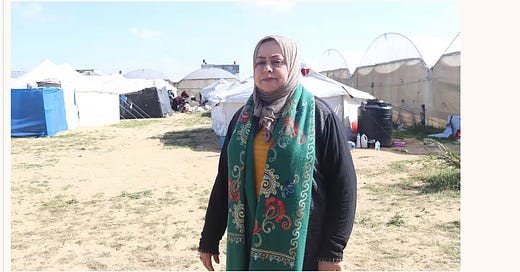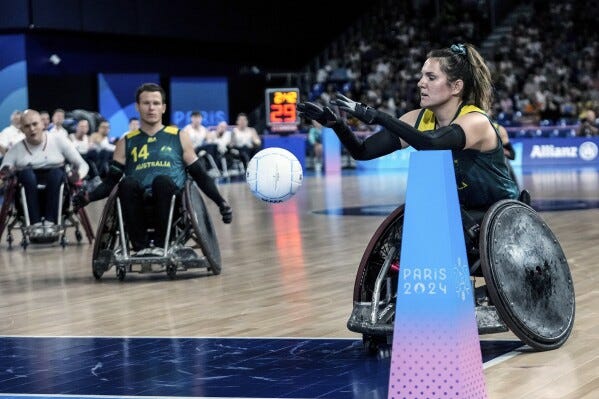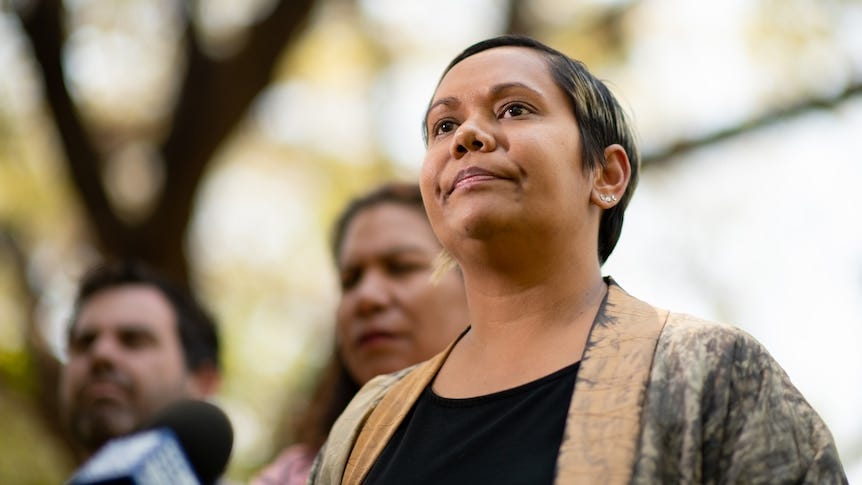Global Roundup: Palestinian Women aid workers, Women's Wheelchair Rugby, 1st Indigenous Woman leads Major Australian Party, Afro-Colombian Trans Women, Malawi Music Star vs Elder Abuse
Buthaina Subeh is one of the founders of the Wefaq Association. Photograph: Courtesy of ActionAid
Gaza is now the world’s deadliest place for aid workers, who are providing urgent care to 1.9 million internally displaced Palestinians. Many have lost loved ones themselves yet continue to support others despite the risk.
For women aid workers, it is doubly difficult, writes, Buthaina Subeh, director of the Wefaq Association for Women and Childcare, which provides protection, economic, legal and psychological support, for women who have been victims of violence and for children at risk.
I will not hide from you that I suffer from anxiety. Like most humanitarian workers, I can’t sleep. I can’t have sound, uninterrupted sleep as a result of the fear. Fear haunts us in every step…As the war in Gaza began, I continued to work due to my belief in women’s rights as human rights. This is what inspired me in the first place and is the reason I continue…Our work exposes us to many violations and a feeling of disbelief. Imagine that you are going to help people but you think that you will not return to see your children and loved ones.
After the sixth month, fearing for her childre, Subeh was forced to go to Egypt with her daughter to secure a place for the rest of the family to follow. The invasion of Rafah happened before her young sons and husband could join her from Gaza in Egypt. They have been separated for six months. Her husband and children were forced to leave their house and move to another area to live in tents for displaced people.
A month ago, their house in Gaza was completely destroyed.
Subeh writes that women in Gaza feel they must maintain a front of steadfastness so that their families do no collapse. After eleven months of genocide “the women of Gaza are physically exhausted, psychologically broken.” She calls on women around the world to do all they can to end the war.
We want to live a normal life among our children in safety, planning for the future. As women of Gaza, we have been completely destroyed psychologically. We have no dreams, no hopes. We only wish to stay alive: us and our children. To women all over the world I say: form alliances and raise your voice loudly in order to stop the war and to respect human dignity. -Buthaina Subeh
Ella Sabljak of Australia takes the ball to try during the 2024 Paralympics Wheelchair Rugby, Australia versus Great Britain, Thursday, July 29, 2024. (Photo: AP/Michel Euler)
Women are making history at wheelchair rugby, a mixed-gender but male-dominated sport, at the Paralympics. Australia has an unprecedented three women on its 12-player team in Paris. Denmark, Germany and Japan also have female players, the U.S. got its first female player at this year’s games, leaving host nation France, defending champion Britain and Canada as the only teams that don’t.
The total of eight women competing in that sport is double the number that made wheelchair rugby teams at the Tokyo Paralympics in 2021. But the 88 men in Paris still outnumber the women 11-to-1, spurring the female paralympians to push for more progress.
It’s going too slowly…We’re definitely paving the way in Australia…Other teams definitely need to catch up, understand and recognize that women add value to the game. You know, we’re not burdens. We’re not different. We’re not difficult. We are, like, elite athletes amongst other elite athletes. And so I think people need to change their perspective on what women bring to the table. -Ella Sabljak, Australian national team.
Photo: (ABC News: Che Chorley
It makes her the first Indigenous woman to lead a major political party in Australian history.
Territory Labor named Uibo as its new opposition leader 10 days on from the party's landslide defeat in the Northern Territory election. Nunggubuyu woman Uibo has taken up the top job alongside an almost entirely Aboriginal caucus.
Labor has also appointed the member for Daly, Yaegl man, Dheran Young as the deputy opposition leader, who first won a seat in parliament in the 2021 Daly by-election.
I’m very proud … the Territory is one third Aboriginal population … that make up the width and the breadth of the Territory. -Selena Uibo
Uibo said she was "proud and privileged" to lead a "strong, robust and accountable opposition".
I love the Northern Territory, I work hard every day for my electorate…I've been honoured to have two terms as the member for Arnhem and now a third term…I can reassure Territorians that we'll be working very hard in opposition, as the Labor opposition, to ensure that the new CLP government is held to account and that they deliver for Territorians as they've promised. -Selena Uibo
Uibo was first elected to parliament in 2016, when she won the seat of Arnhem from an independent, before she went on to retain it for Territory Labor at the 2020 election.
She has spent six of the past eight years on the last government's frontbench, holding multiple ministries including remote housing, health, education, Aboriginal affairs and justice.
Maria del Pilar Escoba (Twiggy). Photo by Lyann Cuartas, from Las Jaibas Productora
The eight episodes of “Oshúm and the Tones of Water” feature inhabitants of the Anchicayá, Dagua and Cauca, three rivers in their region. “Oshúm” is the “orisha,” or spirit, of water in the Yoruba religion of West Africa and several others in the African diaspora. That is what inspired this series, which, as visual artist Lyann Cuartas says, navigates the rivers and profiles their people.
The project is an exploration of how Black and trans communities relate to water. These ideas allow us to broaden our perspectives on bodies of water. They are not there just for extraction or as natural resource, but a subject with whom we are making an exchange. It is a responsibility of us both. And spirituality mediates that relationship. In these communities, spirituality is a means to connect with the river, to exercise care, to give it symbolic meanings. -Lyann Cuartas
The stories in this project intertwine the mystery of the rituals around the river, the sweetness of childhood memories and the violence against its waters and communities. In each episode, brutality shows up: armed groups that displace communities, destroy the forests and fill the rivers with mercury in search of gold; coca crops and poisoned rain from aerial spraying; infrastructure projects that break the waterways and fill the waters with sediment. There is barbarism, but also resistance. The communities of these rivers have organized themselves into associations, educational centers, artistic collectives and memory projects. The episodes deal with all these initiatives.
Each protagonist in this audiovisual project has a unique relationship with the river. If for Ana Gamboa the river is the cradle and home of all her childhood memories, for activist Maria del Pilar Escoba, Cauca was a haven, a place of recreation that was denied to trans women. Twiggy, as she is known in Colombia, grew up in Cali and fled to Europe in the eighties, when paramilitary groups carried out what is sinisterly known as social cleansing, murdering sex workers, homosexuals, homeless people and other marginalized people.
Twiggy remembers that trans women were not allowed in public swimming pools.
[Due to] the fact that trans women had no recreation, no socialization, no places of welcome and embrace, it was very special for us to go on a Monday to Pance [a district in the south of Cali] where we could meet, where we could eat the famous mushrooms with condensed milk, it was a time for a joint, to find, outside of the clientele, the boy you liked. That was Pance for us. -Twiggy
Jetu, wearing clothing designed by House of Xandria, poses during a World Elder Abuse Awareness Day event in Blantyre, Malawi, on July 5, 2024.
Her fans and admirers have crowned her the Malawian queen of amapiano — a subgenre of South African house music — which dominates the music scene in Malawi.
Jetu started her music career last year, at the age of 71 — soon after the death of her husband, in central Malawi, where she was staying.
Relatives suggested she go to Blantyre to stay with grandchildren. Those grandchildren were “doing music,” she said, and asked her to join them as a way to overcome her loneliness and boredom.
Under the management of her grandson, musician Blessings Kazembe, popularly known as Emmu Dee, Jetu has released three powerful singles: “Wakalamba Wafuna,” “Chakwaza” and “Simunatchene.”
Jetu is excited that music has allowed her to go places she never dreamed of visiting, including Johannesburg and Cape Town when she performed in South Africa in June.
Andrew Kavala, executive director of the Malawi Network of Older Persons' Organizations, said that in 2023, his organization recorded 25 killings and 87 cases of violence, including setting fire to homes and assault. That was up from 2022’s 17 deaths.
So far in 2024, he said, 17 elderly people have been killed and 89 have been abused.
Malawi Network of Older Persons' Organizations chose Jetu as an ambassador for elderly Malawians because of her strong appeal to youth, who studies show make 86% of the witchcraft accusations.
We are trying to explore means through which Jetu can use her platform to convey the message to the youth, ‘Stop bullying, stop abusing elderly persons. -Andrew Kavala
Thank you for reading Global Roundup. You can support FEMINIST GIANT by:
Hitting the heart button so that others can be intrigued and read
Upgrading to a paid subscription to help keep FEMINIST GIANT free
Opting for a one-time payment via buying me a coffee
Sharing this post by email or on social media
Mona Eltahawy is a feminist author, commentator and disruptor of patriarchy. She is editing an anthology on menopause called Bloody Hell! And Other Stories: Adventures in Menopause from Across the Personal and Political Spectrum. Her first book Headscarves and Hymens: Why the Middle East Needs a Sexual Revolution (2015) targeted patriarchy in the Middle East and North Africa and her second The Seven Necessary Sins For Women and Girls (2019) took her disruption worldwide. It is now available in Ireland and the UK. Her commentary has appeared in media around the world and she makes video essays and writes a newsletter as FEMINIST GIANT.
FEMINIST GIANT Newsletter will always be free because I want it to be accessible to all. If you choose a paid subscriptions - thank you! I appreciate your support. If you like this piece and you want to further support my writing, you can like/comment below, forward this article to others, get a paid subscription if you don’t already have one or send a gift subscription to someone else today.








